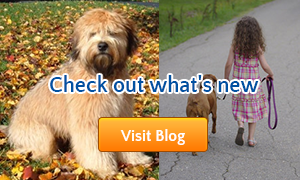 The Bernese Mountain Dog, also referred to as the Berner Sennenhund or the Bernese Cattle Dog, is a Swiss breed that originated about 2,000 years ago. This breed descends from the Roman Mastiff and the native flock-guarding dogs in Switzerland. This breed was developed to withstand the extremely cold winter weather found in this area.
The Bernese Mountain Dog, also referred to as the Berner Sennenhund or the Bernese Cattle Dog, is a Swiss breed that originated about 2,000 years ago. This breed descends from the Roman Mastiff and the native flock-guarding dogs in Switzerland. This breed was developed to withstand the extremely cold winter weather found in this area.
This dog grows to be about 27.5 inches tall. It usually weighs between 87 and 90 pounds. It has a long, thick, wavy, and shiny coat. Its body is usually jet black. This dark patch is accented with white chest patch and muzzle strip, and red or brown markings on its cheeks.
This is a big friendly dog that can make a good family pet. However, it is better suited for families with older kids, as it may unintentionally knock over smaller kids. The males of this breed tend to be male-aggressive, so they may not be the best pets to keep in a multi-pet household. In addition to being a family dog, they can also used for guard dogs, watch dogs, trackers, and working  dogs.
dogs.
Because of their large size and potential for dominance the Bernese Mountain Dog should receive early training to establish the proper dominant relationship.
Also known as the Berner Sennenhund or the Bernese Cattle Dog, these dogs are a working breed trained to herd livestock and pull carts. The Bernese is easy to obedience train. It can be successful in the show ring dog as well. These dogs can be sloppily affectionate and are best in the hands of an experienced handler. They form a strong bond of love with their family.
Pulling heavy loads was the original purpose of the Bernese Mountain Dog. Helping with sheep and cattle drives and guarding the barnyards were the other duties expected of this farm dog. There are three other kinds of Swiss mountain cattle dogs: Appenzel-ler Sennenhund, Entelbucher Sennen-hund, and the Greater Swiss Mountain Dog. Only the Bernese Mountain Dog has the long silky coat.
The Bernese Mountain Dog is a gentle, happy breed which makes a great family companion. They are gentle, cheerful, and they love children. Their instincts provide a natural watchdog warning of anything or anyone approaching, but they are not aggressive. They are a “couch potato” breed but are capable of high energy when motivated. Due to the very loyal nature of the breed, adoption after 18 months can create a difficult adjustment for the dog.
Socialize well as a puppy. The Bernese Mountain Dog are slow to mature, acting like a puppy longer than other breeds. They are rather friendly with strangers and generally good with other pets and dogs. Owners will only run into issues with this dog if they do not display a natural leadership towards the breed, treating it more like their baby and lacking the knowledge as to what dogs instinctively need to be stable minded.
Because it is so willing to please, the Berner responds to the gentlest of training methods. No yelling or yanking or scolding needed, just show the dog what to do. Provide positive reinforcement when the Berner follows your commands and practice with your dog to make the behavior an ingrained pattern. Owners should not be fooled at the breeds gentle demeanor, however; an untrained Berner weighing 80 pounds or more can be a menace, not because it is likely to be domineering or aggressive, but because it behaves like a bull in a china shop.
For a working dog, the Bernese Mountain Dog is surprisingly lazy. Due to the breeds heavy bone structure and propensity for joint problems, the Bernese Mountain Dog tends to be active and energetic for only short bursts of time every day. This can be a relief for some owners who are less active themselves, but it can also be a disappointment for lovers of large working dogs or mastiffs who’re expecting a companion for long bike rides, country jogs, or other high-endurance, high-energy canine activities.
Feed your Bernese mountain dog high-grade dog food. The first ingredient should be meat if you want a quality product. Crude protein should be no less than 30 percent and crude fat no less than 20 percent. Also, the fiber content should be 4 percent or less.
The Bernese Mountain Dog’s long, thick double coat needs daily to weekly brushing. Extra care should be given to the coat during shedding season. Bathing or dry shampooing should be administered as necessary. This breed sheds heavily during shedding season. When it comes to brushing these dogs, remember its not just a quick brush and its done. They have a double coat so a lot of time is required to get that shiny and smooth coat every dog owner strives for.








One Response to “How to Train a Bernese Mountain Dog”
I have a super smart wellll train Bernese 5 yrs old. as a young dog he loved dogs
About 3 yrs ago he got a hate on for large dogs. I took him to two different trainers, and
He was fine with other dogs. She told me my dog was fine ,,So it seem to be when
He is with me, or I’m around he wants to attack any large dog. I don’t understand ? If I muzzle him, he Is calm around
The other dogs,